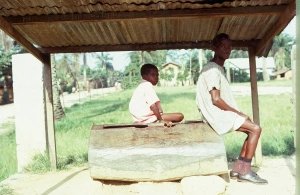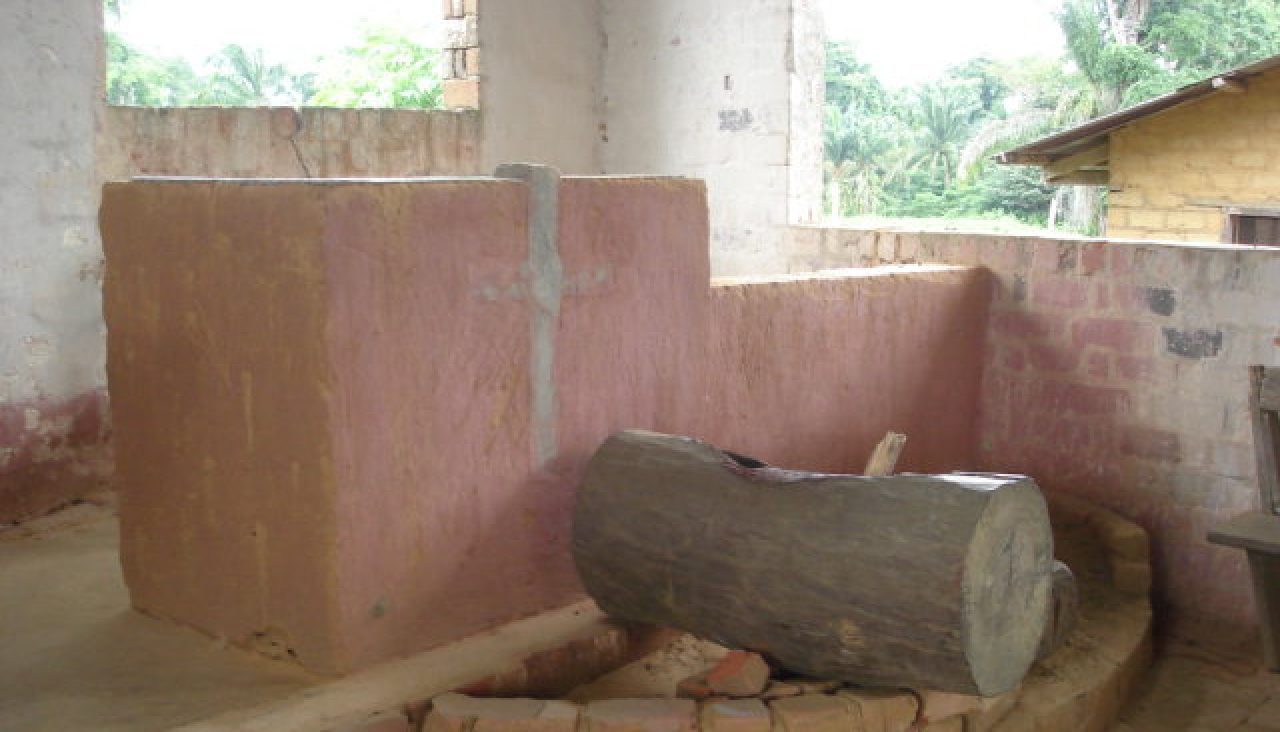
A recent visitor to our home prompted me to take out for the first time in twenty plus years the python skin from Congo. It was brittle and a few of the scales fell as we rolled the skin out on the living room floor; forty years out of the rain forest in our relatively dry atmosphere will do that. We took out the tape measure and no one marveled at the length more than I: eighteen feet. I had estimated it to be between eight and ten feet.
The python skin along with pre-ban ivory figurines are among the tangible possessions I carried away from two years in Congo 1969-71. Rarely in the forty years since have I stopped to admire the delicately carved ivory figurine of a woman’s head or the design on a three foot iron “executioner’s” knife. But the tangible artifacts from Congo serve as occasional reminders of the lasting impact on my life of those two years. And their display in my home represent a public testimony that the Congo experience shaped my life in decisive and indelible ways. They are clues to who lives inside the house and who I am. They help others get to know me as they help me understand myself.
What a joy to find on my return to Congo that my presence forty years before had not been

forgotten by the Congolese. Joseph Ikete, the bright, dignified youth leader of 1969, met me at the airport in Mbandaka and we laughed about the photo I had taken of him and his wife at their home in 1971. A couple of weeks after my arrival in June, 2010, we dined in his home again, but this time daughter Christine and husband joined us. She now serves as the Director of the Women’s Department of the Disciples of Christ community.
What a joy it has been to share the 2010 experience in Congo with you readers of this blog. That I have continued these postings for two years has helped me understand the place of Congo in my life, how it has shaped who I am and especially its role in shaping my faith. If we accept Augustine’s definition of theology as “faith seeking understanding”, theology has been the overarching theme/tag/category of every posting.
So as wife Kate Moyer and I prepare for a two year assignment with Disciples and UCC churches in Mexico, beginning this fall, I want to wrap up my lokoleyacongo blog postings with some questions that have guided and will guide my future theological reflections on what is going on in Congo.
How could the richest nation in Africa with an incomparable wealth in strategic minerals and other natural resources rank at the bottom of the world’s nations on the UN Development Index (number 187 out of 187 countries ranked)?
How could the nation considered a priority for African development aid by the United States have failed so miserably at the task of nation-building and forming a government which is held accountable by the people?
What is the responsibility of the Church in the U.S. and in Congo in upholding the human rights of the Congolese people? When will the unified Protestant Church, the Church of Christ of Congo defend the fundamental right of one person one vote and the nation’s right to hold free and fair elections?
When will the weak and corrupt regime in Kinshasa be seen as the primary source of continued conflict in eastern Congo – which an article in the National Geographic called the richest tract of land on earth? And when will Congo be permitted to form a government made up of persons committed to serving the people?

There is little doubt that Congo is a tough assignment. The questions above will perplex and bedevil anyone who goes there. But I hope this blog has succeeded in highlighting some of the rewards awaiting anyone who makes the effort to live and celebrate life alongside the Congolese. One of those rewards comes from the insight that Congo and what happens there is at the front line of African and, indeed, of human liberation.
Since my return to the States in 1971, we have celebrated the end of Portuguese colonial rule in Africa and the end of apartheid rule in southern Africa. There has even been progress in Sudan with the formation of an independent South Sudan in 2011. Among the new nations of Africa, only in Congo has there been retreat from the people’s aspirations in 1960. Only in Congo has the government failed to protect and further the rights of the people to such an extent they now proclaim the Mobutu era as the good old days.
At the same time, the Protestant churches of Congo have carried out ministries we in the States have had a hand in and can be proud of. Among the sixty plus Congolese Protestant denominations, the Disciples of Christ played a leading role in the creation of the unified Church of Christ of Congo and the Disciple Rev. Itofo Bokambanza Bokeleale served as its first President for 30 years. In many areas of the country, Protestant churches are the lone providers of health, education and community development services. While the government often fails in its promise to support these services in urban and rural areas, the churches and its leaders help raise the funds to keep them going. In the fields of public service, the churches both Protestant and Catholic lead the way.
In the midst of the decline in the country’s roads and other infrastructure, the growth of the Protestant movement in Congo challenges our imaginations. The Disciples community has grown from around 25,000 members in 1960 to more than 650,000 today. With missionary zeal, Congolese Disciples have planted new churches throughout Congo and the neighboring Congo Brazzaville. The honor and respect accorded the U.S. missionaries who first planted the seeds extends to those fortunate enough to visit and represent the U.S. Church in our day.
To those who might consider a longer visit to Congo in a missionary assignment today, I can assure you that your presence there would be answering the Congolese Disciples’ prayers. It has been many years since someone from the U.S. served with the Disciples in Congo in a longer term assignment. For several years, the office of Global Ministries (www.globalministries.org) has been seeking to fill the two fully funded positions described on the website. The need for French skills and the high humidity in Equateur Province have ruled a Congo assignment for Kate and me but I would welcome contact with anyone considering the call to serve there. You may reach me at dsmithy1@verizon.net


Thank you for your keen insight and heartfelt concern for Congo.
God bless you on your new journey.
Bob Smith
LikeLike
I pray your work in Mexico will be interesting and fruitful. We will sorely miss your deep research and insight into Congo joys and troubles. We came home with a LOT of souvenirs and I’m presently having some of the many Basenji dog bells we brought sold on e-bay, while keeping enough to share with the younger family members. Since Basenjis are becoming popular in the U.S. now, it’s amazing what such dog owners are willing to pay for them. Proceeds going to our weekly Sunday morning breakfasts for homeless at church. Maybe I can find someone interested in selling a large number of handmade knives we have and help out the Bolenge hospital.
Phyllis Weare
LikeLike
May God continue to bless the work that He’s doing through you for the people of Congo and wherever He may lead you.
Aimee
LikeLike
Have enjoyed reading your reflections on the Congo! Wishing you the “Best” as you begin your new adventure…..and shall look forward to future reports of your work/experience in Mexico.
LikeLike